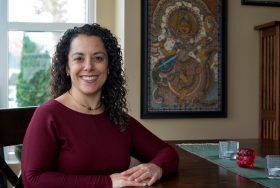Assistant Professor Amy L. Allocco visits India next year through a $25,000 grant from the National Endowment for the Humanities to interview families who seek protection and strength from spirits conjured during elaborate public ceremonies.

Amy L. Allocco, the university’s distinguished emerging scholar in religious studies, departs in July to observe and study Hindu rituals where participants ask spirits of dead female relatives to return to the world to safeguard the families they left behind.
The rituals have received little attention from researchers, and Allocco theorizes they may be reshaping a religion practiced by most of India’s 1.2 billion citizens. Globalization has changed the cultural dynamics of the world’s largest democracy, she said, creating newfound anxieties that many address through religion.
“People feel a sense of desperation about keeping up and they have only limited power to respond to that anxiety through social, political and economic avenues,” Allocco said. “These rituals are one way that social tensions are performed publicly.”
Most scholarly work on the Hindu religion focused on brahminic death rites among the elites of Indian society, Allocco said. Those rites are oriented toward “nourishing the soul” and helping the dead move toward reincarnation and, eventually, spiritual liberation.
For some lower castes, rituals do the opposite by bringing the dead back into the world “to facilitate the needs of living kin.” The two rituals she intends to study involve women who died as postmenarchal girls and married women with living husbands.
Elaborate ceremonies rely on musicians to summon dead spirits with drumbeats and songs that convince the dead to speak through a living relative. Grief, loss and accusations of neglect are often expressed in these proceedings.
Allocco plans to use ethnographic methods to observe and record performances and dialogues with the dead, and conduct both formal and informal interviews in Tamil with dozens of ceremonial participants.
Allocco initially applied for research funding from the American Institute of Indian Studies, a consortium of 80 U.S. colleges and universities that is headquartered in New Delhi and has offices in Chicago. The competitive process yielded 157 applications from around the country, and the top three proposed projects each received a $25,000 grant from the National Endowment for the Humanities under its Fellowship Programs at Independent Research Institutions.
Allocco also applied for a Fulbright award to support the research project. She recently learned that she was recommended for the Fulbright-Nehru fellowship by the Council for International Exchange of Scholars of the Institute of International Education.
Allocco joined the Elon faculty as assistant professor of religious studies in 2009 after completing her doctorate in the West and South Asian Religions program in the Graduate Division of Religion at Emory University. She holds a master of theological studies degree from Harvard Divinity School and a bachelor’s degree from Colgate University.
Allocco’s research focuses on vernacular Hinduism, especially contemporary Hindu ritual traditions and women’s religious practices, in the state of Tamil Nadu in South India, where she has been studying, learning the Tamil language and conducting fieldwork since 1995. She currently serves as the faculty director of Elon’s Global Neighborhood residential complex.
Trained both as an ethnographer of South Asian religions and in approaches to Hindu textual traditions, Allocco has developed specializations in performance and ritual studies as well as gender and religion.
“Research on oral traditions and women’s practices are important to the study of religion in ways we didn’t see even a generation ago,” she said. “This is true of all religions, not just Hinduism.”


